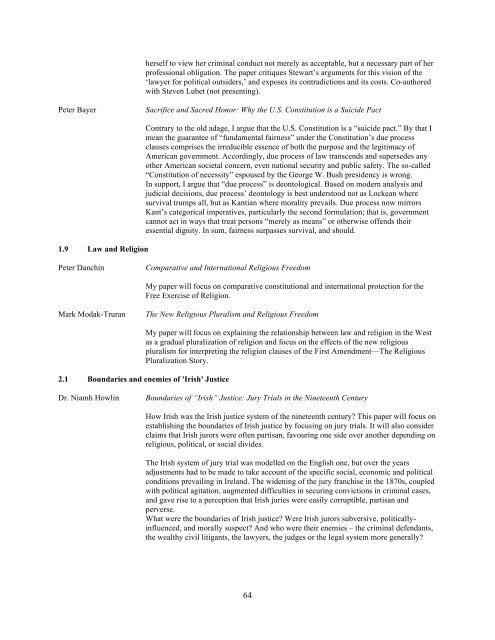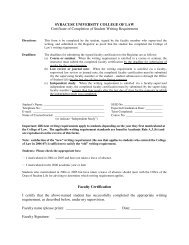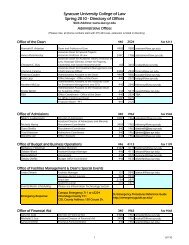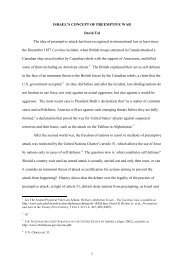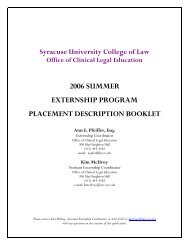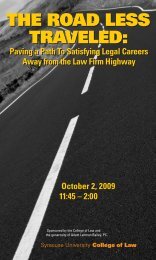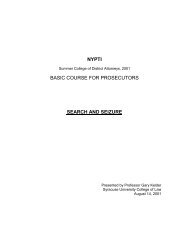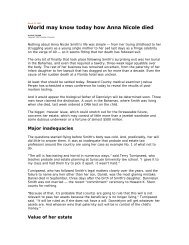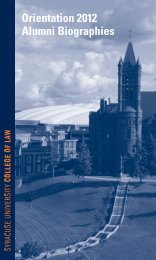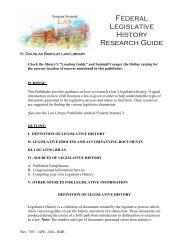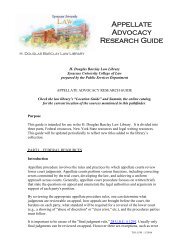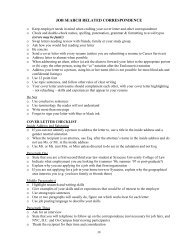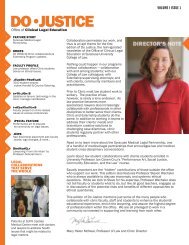2011 Conference Program (PDF) - Syracuse University College of Law
2011 Conference Program (PDF) - Syracuse University College of Law
2011 Conference Program (PDF) - Syracuse University College of Law
You also want an ePaper? Increase the reach of your titles
YUMPU automatically turns print PDFs into web optimized ePapers that Google loves.
herself to view her criminal conduct not merely as acceptable, but a necessary part <strong>of</strong> her<br />
pr<strong>of</strong>essional obligation. The paper critiques Stewart’s arguments for this vision <strong>of</strong> the<br />
‘lawyer for political outsiders,’ and exposes its contradictions and its costs. Co-authored<br />
with Steven Lubet (not presenting).<br />
Peter Bayer<br />
Sacrifice and Sacred Honor: Why the U.S. Constitution is a Suicide Pact<br />
1.9 <strong>Law</strong> and Religion<br />
Contrary to the old adage, I argue that the U.S. Constitution is a “suicide pact.” By that I<br />
mean the guarantee <strong>of</strong> “fundamental fairness” under the Constitution’s due process<br />
clauses comprises the irreducible essence <strong>of</strong> both the purpose and the legitimacy <strong>of</strong><br />
American government. Accordingly, due process <strong>of</strong> law transcends and supersedes any<br />
other American societal concern, even national security and public safety. The so-called<br />
“Constitution <strong>of</strong> necessity” espoused by the George W. Bush presidency is wrong.<br />
In support, I argue that “due process” is deontological. Based on modern analysis and<br />
judicial decisions, due process’ deontology is best understood not as Lockean where<br />
survival trumps all, but as Kantian where morality prevails. Due process now mirrors<br />
Kant’s categorical imperatives, particularly the second formulation; that is, government<br />
cannot act in ways that treat persons “merely as means” or otherwise <strong>of</strong>fends their<br />
essential dignity. In sum, fairness surpasses survival, and should.<br />
Peter Danchin<br />
Comparative and International Religious Freedom<br />
My paper will focus on comparative constitutional and international protection for the<br />
Free Exercise <strong>of</strong> Religion.<br />
Mark Modak-Truran<br />
The New Religious Pluralism and Religious Freedom<br />
2.1 Boundaries and enemies <strong>of</strong> 'Irish' Justice<br />
My paper will focus on explaining the relationship between law and religion in the West<br />
as a gradual pluralization <strong>of</strong> religion and focus on the effects <strong>of</strong> the new religious<br />
pluralism for interpreting the religion clauses <strong>of</strong> the First Amendment—The Religious<br />
Pluralization Story.<br />
Dr. Niamh Howlin<br />
Boundaries <strong>of</strong> “Irish” Justice: Jury Trials in the Nineteenth Century<br />
How Irish was the Irish justice system <strong>of</strong> the nineteenth century This paper will focus on<br />
establishing the boundaries <strong>of</strong> Irish justice by focusing on jury trials. It will also consider<br />
claims that Irish jurors were <strong>of</strong>ten partisan, favouring one side over another depending on<br />
religious, political, or social divides.<br />
The Irish system <strong>of</strong> jury trial was modelled on the English one, but over the years<br />
adjustments had to be made to take account <strong>of</strong> the specific social, economic and political<br />
conditions prevailing in Ireland. The widening <strong>of</strong> the jury franchise in the 1870s, coupled<br />
with political agitation, augmented difficulties in securing convictions in criminal cases,<br />
and gave rise to a perception that Irish juries were easily corruptible, partisan and<br />
perverse.<br />
What were the boundaries <strong>of</strong> Irish justice Were Irish jurors subversive, politicallyinfluenced,<br />
and morally suspect And who were their enemies – the criminal defendants,<br />
the wealthy civil litigants, the lawyers, the judges or the legal system more generally<br />
!<br />
64


